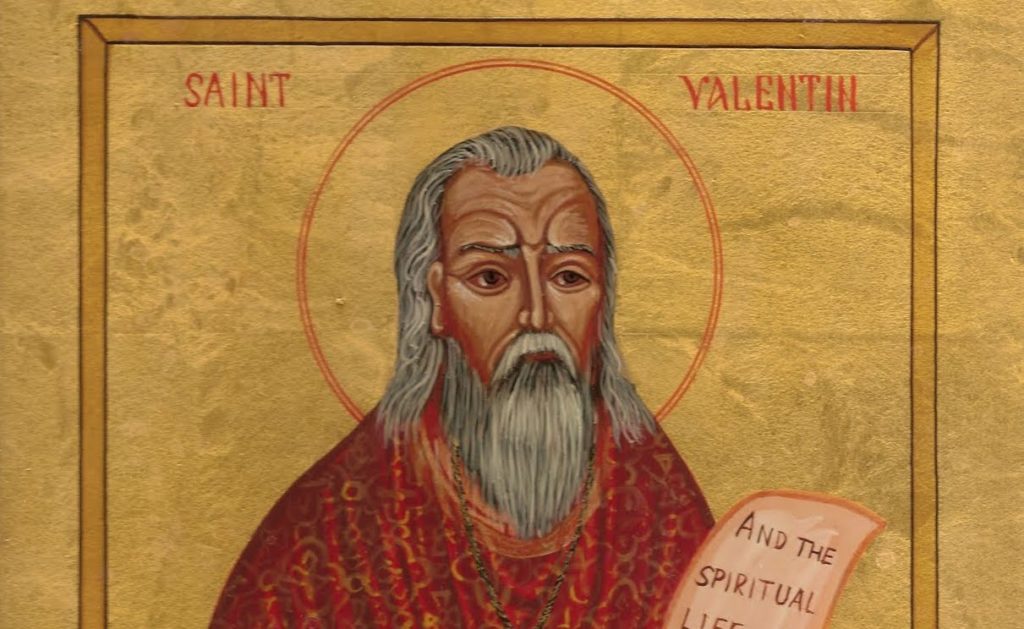… patron of covenantal love; a love that transcends mere
romance and erotic desire by ascending to the dizzying heights
of divine–human, fruitful union.

Some will object that I’ve included a chapter on Saint Valentine in a book reflecting on the season of Epiphany.
Since the beginning of Lent is not a fixed date, the Feast of Saint Valentine, depending on the year, can fall at the end of the longer tradition of Epiphany, or at the beginning of Lent. I have somewhat randomly decided to include it here as it begins to turn our sights from the theme of light in Epiphany to what I would argue is the main theme of Lent, which is Love. Covenant Love.
According to tradition, Bishop Valentinus of Terni was executed – beaten with clubs and then beheaded – by order of Emperor Claudius II on February 14, 269 CE. His body was hastily buried on the outskirts of Rome, only to be dug up days later and returned to his home by his disciples. His feast day was instituted in 496 by Pope Gelasius I, who included the martyred priest among those “whose names are justly reverenced among men, but whose acts are known only to God.”
Indeed, little is known about Saint Valentine that is historically verifiable. His legend may well be a composite figure of several different men. Enough confusion about his identity exists that the Catholic Church discontinued veneration of him in 1969, though his name remains on its list of officially recognized saints.
My own interest in Valentine concerns his legend as “a patron of covenantal love; a love that transcends mere romance and erotic desire by ascending to the dizzying heights of divine-human, fruitful union.”
The story goes that he became an annoyance to Claudius when, against imperial decree, Valentine defiantly performed Christian marriages at a time when the emperor needed young men to fight the various wars on his vulnerable borders (marriage temporarily exempted men from military service). When Valentine was brought before the emperor, Claudius found that he quite liked the recalcitrant holy man. But Valentine could not be swayed; instead, he fervently encouraged Claudius to embrace Christianity. The emperor declined and then ordered Valentine’s execution. According to legend, on the night before his death, the soon-to-be-martyred bishop of Terni wrote a tender letter to his jailor’s daughter whom he had previously healed of blindness. He signed the note “your Valentine.”
To be sure, this is a dubious legend. But it has a poetic veracity that is worth our attention. It is interesting to me how Saint Valentine’s Day, a day when we celebrate covenantal love, is perhaps hastily buried at the outskirts of Epiphany, on the border with Lent: a penitential season set aside for the Christian faithful to contemplate, with sorrow and tears, the devastation of infidelity. Liturgically speaking, Valentine’s Day functions like a set of binoculars to help us look through the wasteland of infidelity to the greening of Jesus’ “love that will not let me go.” When we consider how Valentine gave his life for covenant love, it isn’t a stretch to see him as reminder of Christ’s restoration of the covenantal relationship between God and humanity through the giving of his own life.
It may be time for True Love’s disciples to dig up Valentine’s remains and carry them home, as it were, to be properly memorialized. For in our day, love has been so trivialized and distorted that movie marketers recently thought themselves clever to release Fifty Shades of Grey – a movie about denigrating, sado-masochistic eroticism – on, of all days, Valentine’s Day. More tellingly, they were rewarded on the opening weekend with sales of $85 million.
While I don’t mean to be a cultural curmudgeon, I do take to heart author and musician Andy Crouch’s suggestion that the proper antidote to bad culture is good culture. In this regard, I offer a modest protest that I hope will honour Valentine’s legend as well as the truest love and Lover he beheld. The song below could be read as a note composed on the eve of a lover’s execution. If we have eyes to see, we may even be able to make out a signature – in faded ink at the bottom – “your Valentine.”
This Is Love
Music and lyrics by Steve Bell
Appears on the 1997 CD release: Romantics and Mystics
Father just before the hour comes
That was set aside to glorify Your Son
With a glory from before the world began
With a glory given to no other manProtect the ones You’ve given Me to love
I so desire that none of them be lost
They’ve yet to understand the mystery
Why the Son of God would wash another’s feetBut this is not the same
It’s a different thing altogether
This is not the same
It’s another thing all together
This is love
This is loveMy prayer is not for only these alone
But for those who follow after they’re gone
May they understand the love You have for me
As the kind of love that changes everythingThey argue who will sit next to the throne
And I cringe to hear them say Thy Kingdom come
They think they know what they’re getting into
We both know that they haven’t got a clueBut this is not the same
It’s a different thing altogether
This is not the same
It’s another thing all together
This is love
This is loveHere’s something that they won’t like
Someone’s coming to take the life
No one has to look farther than me
I am HeSome will trust in the things they think they know
They should think again and let them go
Put away the sword and get behind
And let me die’cause this is not the same
It’s a different thing
All together
This is not the same
It’s a better thing
All together
This is love
This is love